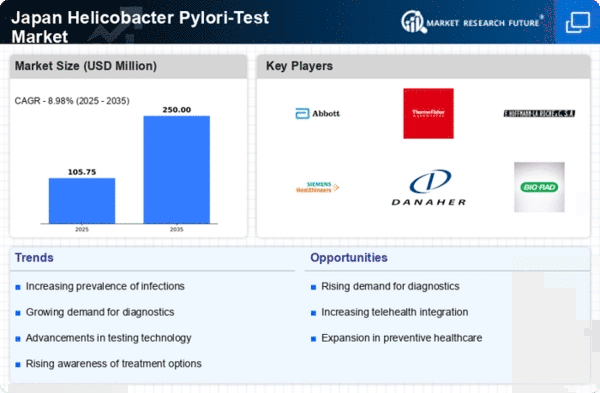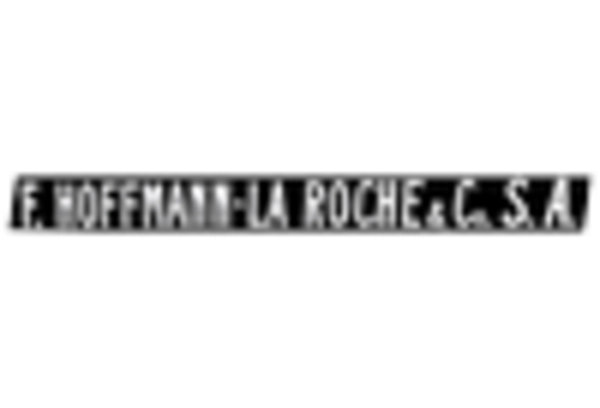Advancements in Diagnostic Technologies
Technological innovations in diagnostic testing are significantly influencing the helicobacter pylori-test market. The introduction of non-invasive testing methods, such as breath tests and stool antigen tests, has improved patient compliance and diagnostic accuracy. These advancements allow for quicker results and reduce the need for invasive procedures like endoscopy. In Japan, where healthcare quality is paramount, the adoption of these advanced technologies is likely to enhance the overall testing experience. Moreover, the market is witnessing the development of point-of-care testing devices, which facilitate immediate diagnosis and treatment decisions. As these technologies become more accessible, the helicobacter pylori-test market is expected to experience substantial growth, driven by the demand for efficient and patient-friendly testing solutions.
Government Initiatives and Health Policies
Government initiatives aimed at improving public health are playing a pivotal role in shaping the helicobacter pylori-test market. In Japan, health policies that promote screening and early detection of gastrointestinal diseases are likely to increase the demand for testing. The Ministry of Health, Labour and Welfare has been actively involved in campaigns to raise awareness about the risks associated with Helicobacter pylori infections. Such initiatives not only educate the public but also encourage healthcare providers to incorporate routine testing into their practices. As a result, the helicobacter pylori-test market is poised for growth, supported by favorable health policies that prioritize preventive care and early intervention.
Growing Awareness of Gastrointestinal Health
The rising awareness of gastrointestinal health among the Japanese population is a significant driver for the Helicobacter Pylori-Test Market. As individuals become more informed about the link between Helicobacter pylori and serious health conditions, there is a growing inclination to seek testing. Educational campaigns and media coverage have contributed to this heightened awareness, prompting more people to consult healthcare professionals regarding their gastrointestinal symptoms. This trend is likely to result in an increase in testing rates, as individuals recognize the importance of early diagnosis and treatment. Consequently, the helicobacter pylori-test market is expected to benefit from this shift in public perception, leading to greater demand for testing services.
Increased Investment in Healthcare Infrastructure
Investment in healthcare infrastructure in Japan is another critical driver for the Helicobacter Pylori-Test Market. The government and private sector are channeling resources into enhancing diagnostic facilities and expanding access to healthcare services. This investment is likely to improve the availability of testing for Helicobacter pylori, particularly in rural and underserved areas. Enhanced laboratory capabilities and the establishment of specialized clinics are expected to facilitate more comprehensive testing options. As healthcare access improves, the helicobacter pylori-test market is anticipated to grow, driven by the increased capacity to diagnose and manage Helicobacter pylori infections effectively.
Rising Incidence of Helicobacter Pylori Infections
The increasing prevalence of Helicobacter pylori infections in Japan is a crucial driver for the helicobacter pylori-test market. Recent studies indicate that approximately 30% of the Japanese population is infected with this bacterium, which is linked to various gastrointestinal disorders, including peptic ulcers and gastric cancer. This rising incidence necessitates effective diagnostic testing, thereby propelling market growth. As healthcare providers emphasize early detection and treatment, the demand for reliable testing methods is expected to surge. Furthermore, the Japanese healthcare system's focus on preventive care aligns with the need for widespread screening, particularly in high-risk populations. Consequently, the helicobacter pylori-test market is likely to expand as more individuals seek testing to manage their health proactively.
















